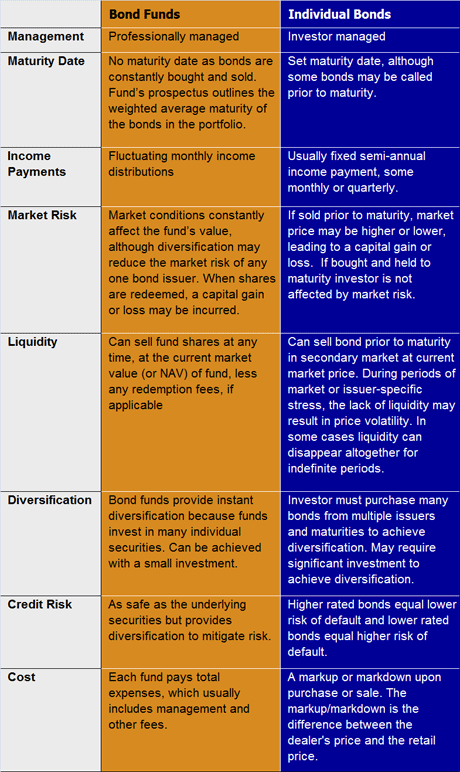Bond Mutual Fund As The Most Appropriate Way To Invest In Bonds
Bond mutual fund is in most cases the most appropriate way to invest in bonds since it is more convenient, liquid, and cost-effective solution then buying individual bonds.
Bond mutual funds are in most cases the most appropriate way to invest in bonds since they are more convenient, liquid, and cost-effective investment then buying individual bonds. Off course, every investor must consider his own risk tolerance, goals, income needs, and desire for liquidity.
What Is A Bond Mutual Fund?
Bond mutual fund is a type of investment company that invests primarily in bonds or other types of debt securities. Depending on its investment objectives and policies, a bond fund may concentrate its investments in a particular type of bond or debt security like government bonds, municipal bonds, corporate bonds, convertible bonds, mortgage-backed securities, zero-coupon bonds or a mixture of types. The securities that bond funds hold can also vary in terms of maturity range (short-term: three years or less; intermediate term: three to 10 years; or long-term: usually 10 years or longer) and other terms like risk, return, volatility and other features.
Bond mutual fund price is based on their Net Asset Value (NAV), or the total market value of the portfolio divided by the total number of fund shares outstanding. A fund's NAV changes daily with market conditions and in some cases with cash inflows and outflows to and from the fund portfolio.
Why Are Bond Mutual Funds So Popular?

Like any investment, it is also important to understand, that bonds are subject to a number of investment risks and by building a portfolio of bonds (by purchasing bonds from different issuers with different maturities) is a good way of diversifying risk. And here comes the most common problem for investors. An effective diversification strategy requires a significant minimum investment to start, by a rule of thumb at least $10,000 or more.
The problem for small investors to put together a diversified bond portfolio is that bonds must be often purchased in large denominations, sometimes $1,000, $5,000, $10,000, $25,000 or even more, depending upon the issuer. This isn't a problem for bond funds, since they trade in smaller share prices, making diversification and reducing risk possible also for those with only a few thousand dollars.
Another very important advantage of bond funds is that the make monthly or quarterly "dividend" payments, as opposed to the semiannual payment schedule common to most bonds.
Types Of Bond Funds
Bond mutual funds can be open-end or close-end in terms of issuing new stocks and actively managed or indexed in terms of management.
Actively Managed Bond Funds
Managers actively buy and sell bonds in pursuit of their investment objective. They sometimes sell bonds at a profit, creating a capital gain, or at a loss if they need cash to pay shareholders who want to sell their shares.
Index Bond Funds
They are not actively managed but constructed to match the composition of a given bond index, such as the Lehman 10-year Bond Index. When the index changes, the portfolio changes automatically.
Open-end Bond Funds
A mutual fund company offers new shares and redeem existing shares continuously, requiring their managers to invest cash coming into the fund and liquidate positions when they need cash to meet redemptions. Investors in open end funds have the choice to collect their interest income and capital gains or reinvest them automatically in new funds shares.
Closed-end Bond Funds
They have a fixed number of shares that trade on exchanges similar to stocks at a price that may be above or below net asset value depending on supply and demand. Closed-end bond funds can be indexed or actively managed. To buy or sell shares in a closed end fund, you have to go through a broker and pay a commission.
Advantages Of Bond Funds Over Individual Bonds
- Management: Fund managers provide dedicated management and save the individual investor from researching issuer creditworthiness, maturity, price, face value, coupon rate, yield, and countless other factors that affect bond investing.
- Diversification: Bond funds invest in many individual bonds, so that even a relatively small investment is diversified�and when an underperforming bond is just one of many bonds in a fund, its negative impact on an investor's overall portfolio is lessened.
- Automatic income reinvestment: In a fund, income from all bonds can be reinvested automatically and consistently added to the value of the fund.
- Liquidity: You can sell shares in a bond fund at any time without regard to bond maturities.
- Pricing: Bond funds typically receive better pricing than the small investor on the bonds they acquire. The "spread" between what the buyer pays and what the seller receives on a specific bond can be huge when purchasing individual issues. Due to their size, scale, and willingness to take large positions, bond funds are going to have much better odds of achieving attractive pricing.
Threats Of Bond Funds
- Bond funds can be even trickier than bonds themselves because they are not really fixed-income investments. Even when a mutual fund's portfolio is composed entirely of bonds, the fund itself has neither a fixed yield nor a contractual obligation to give investors back their principal at some later maturity date; the two key fixed characteristics of individual bonds.
- In addition, because fund managers constantly trade their positions, the risk-return profile of a bond-fund investment is continually changing: Unlike an actual bond, whose risk level declines the longer it is held by an investor, a fund can increase or decrease its risk exposure at the whim of the manager. In this way a bond fund is closer in character to equities than it is to individual bonds.
Written by: Goran Dolenc
Do you find this content useful? Like! Tweet! Recommend! Share!
Back from Bond Mutual Fund to Investing In Bonds
Back from Bond Mutual Fund to Best Online Trading Site for Beginners home page







